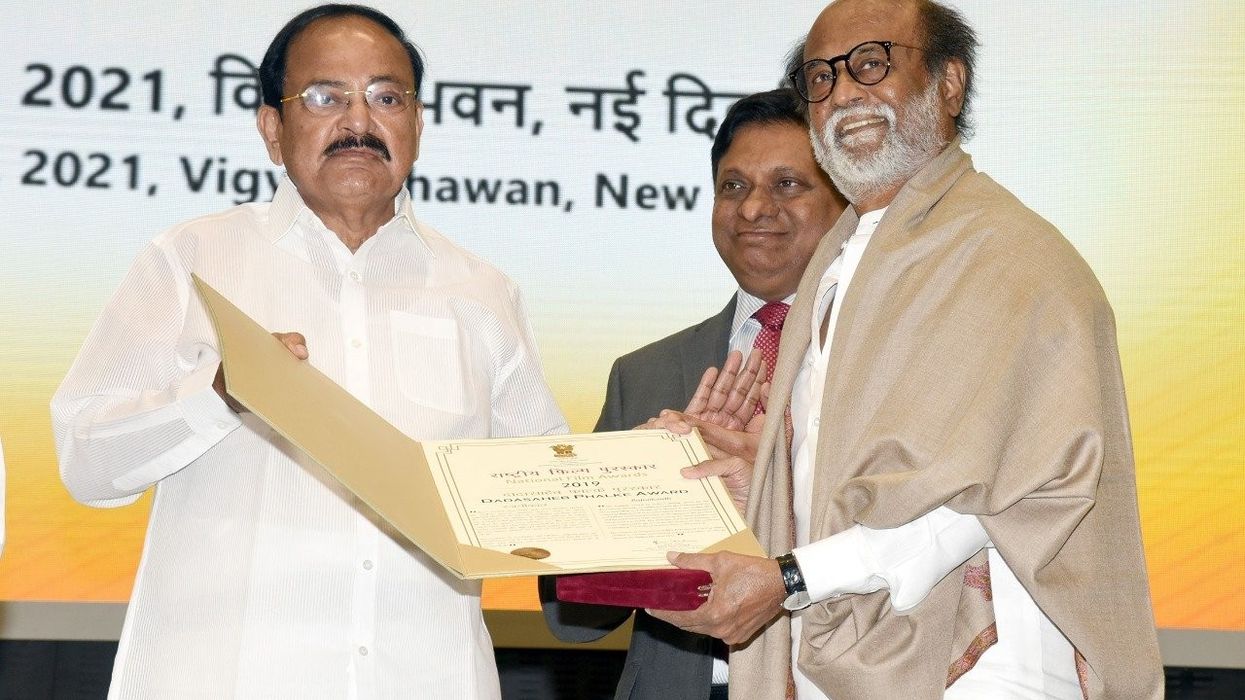At the 67th National Film Awards event held on Monday in New Delhi, Vice President of India M Venkaiah Naidu honoured Tamil Superstar Rajinikanth with 51th Dadasaheb Phalke Award. The event is organised by the Directorate of Film Festivals, which comes under the Ministry of Information and Broadcasting.
Rajinikanth, whose acting career spans four decades, was conferred with the most prestigious award in the field of cinema in India. Apart from Tamil, the superstar has done several notable films in Hindi, Telugu, Kannada, and Malayalam.
Priyadarshan’s Malayalam war epic Marakkar: Lion of the Arabian Sea won Best Feature Film. Starring Malayalam superstar Mohanlal, the film is yet to release in theatres. Its release has faced several setbacks due to the ongoing Covid-19 pandemic. Bollywood actor Manoj Bajpayee and Tamil actor Dhanush won Best Actor award for Bhonsle (2021) and Asuran (2021) respectively. Kangana Ranaut won Best Actress award for two of her films: Panga (2020) and Manikarnika: The Queen of Jhansi (2019).
Here is the complete list of all the winners:
Feature Film Awards
Best Feature Film: Marakkar: Lion of the Arabian Sea (Malayalam)
Best Actor: Manoj Bajpayee for Bhonsle (Hindi), and Dhanush for Asuran (Tamil)
Best Actress: Kangana Ranaut for Panga (Hindi) and Manikarnika: The Queen of Jhansi (Hindi)
Best Supporting Actress: Pallavi Joshi for The Tashkent Files (Hindi)
Best Supporting Actor: Vijay Sethupathi for Super Deluxe (Tamil)
Best Director: Sanjay Puran Singh Chauhan for Bahattar Hoorain (Hindi)
Best Debut Film of a Director: Mathukutty Xavier for Helen (Malayalam)
Best Child Artist: Naga Vishal for KD (Tamil)
Best Action Direction: Avane Srimannarayana (Kannada), Vikram Mor
Best Choreography: Maharishi (Telugu), Raju Sundaram
Best Special Effects: Marakkar: Lion of the Arabian Sea (Malayalam), Siddharth Priyadarshan
Special Jury Award: Oththa Seruppu Size 7 (Tamil), Radhakrishnan Parthiban
Best Lyrics: Prabha Varma for Kolaambi (Malayalam)
Best Music Direction: D. Imman for Viswasam (Tamil)
Best Background Music: Prabuddha Banerjee for Jyeshthoputro (Bengali)
Best Make-up Artist: Ranjith for Helen (Malayalam)
Best Costumes: Sujith Sudhakaran and V. Sai for Marakkar: Lion of the Arabian Sea (Malayalam)
Best Production Design: Anandi Gopal (Marathi), Sunil Nigwekar and Nilesh Wagh
Best Audiography (Location Sound Recordist): Iewduh (Khasi), Debajit Gayan
Best Audiography (Re-recordist of final mixed track): Oththa Seruppu Size 7 (Tamil), Resul Pookutty
Best Screenplay (Original): Jyeshthoputro (Bengali), Kaushik Ganguly
Best Screenplay (Adapted): Gumnaami (Bengali), Srijit Mukherji
Best Screenplay (Dialogue Writer): The Tashkent Files (Hindi), Vivek Ranjan Agnihotri
Best Cinematography: Jallikattu (Malayalam), Gireesh Gangadharan
Best Editing: Jersey (Telugu), Navin Nooli
Best Children’s Film: Kastoori (Hindi)
Best Film on Environment Conservation: Water Burial (Monpa)
Best Film on Social Issues: Anandi Gopal (Marathi)
Best Film on National Integration: Tajmahal (Marathi)
Best Popular Film Providing Wholesome Entertainment: Maharishi (Telugu)
Best Female Playback Singer: Savani Ravindra for Bardo (Marathi)
Best Male Playback Singer: B Praak for Kesari (Hindi)
Best Films In Each Language
Best Hindi Film: Chhichhore
Best Telugu Film: Jersey
Best Malayalam Film: Kalla Nottam
Best Tamil Film: Asuran
Best Paniya Film: Kenjira
Best Mishing Film: Anu Ruwad
Best Khasi Film: Iewduh
Best Chattisgarhi Film: Bhulan the Maze
Best Haryanvi Film: Chhoriyan Chhoron Se Kam Nahi Hoti
Best Tulu Film: Pingara
Best Punjabi Film: Rab Da Radio 2
Best Odia Film: Kalira Atita and Sala Budhar Badla (shared)
Best Manipuri Film: Eigi Kona
Best Marathi Film: Bardo
Best Konkani Film: Kaajro
Best Kannada Film: Akshi
Best Bengali Film: Gumnaami
Best Assamese Film: Ronuwa - Who Never Surrender
Special Mentions: Biriyani (Malayalam), Jonaki Porua (Assamese), Lata Bhagwan Kare (Marathi) and Picasso (Marathi)
Non-Feature Film Awards
Best Voice-over/ Narration: Sir David Attenborough forWild Karnataka (English)
Best Music Direction: Bishakhjyoti for Kranti Darshi Guruji - Ahead of Times (Hindi)
Best Editing: Arjun Gourisaria for Shut Up Sona (Hindi/ English)
Best Audiography: Radha (Musical), Allwin Rego and Sanjay Maurya
Best On-Location Sound Recordist: Rahas (Hindi), Saptarshi Sarkar
Best Cinematography: Savita Singh for Sonsi (Hindi)
Best Direction: Sudhanshu Saria for Knock Knock Knock (English/ Bengali)
Best Film on Family Values: Oru Paathira Swapnam Pole (Malayalam)
Best Short Fiction Film: Custody (Hindi/ English)
Special Jury Award: Small Scale Societies (English)
Best Animation Film: Radha (Musical)
Best Investigative Film: Jakkal (Marathi)
Best Exploration Film: Wild Karnataka (English)
Best Educational Film: Apples and Oranges (English)
Best Film on Social Issues: Holy Rights (Hindi) and Ladli (Hindi)
Best Environment Film: The Stork Saviours (Hindi)
Best Promotional Film: The Shower (Hindi)
Best Arts and Culture Film: Shrikshetra-Ru-Sahijata (Odia)
Best Biographical Film: Elephants Do Remember (English)
Best Ethnographic Film: Charan-Atva The Essence of Being a Nomad (Gujarati)
Best Debut Non-Feature Film of a Director: Raj Pritam More for Khisa (Marathi)
Best Non-Feature Film: An Engineered Dream (Hindi)
Other Awards
Most Film Friendly State: Sikkim
Best Book on Cinema: A Gandhian Affair: India’s Curious Portrayal of Love in Cinema, by Sanjay Suri
(Special mentions: Cinema Paharana Manus by Ashok Rane and Kannada Cinema: Jagathika Cinema Vikasa-Prerane Prabhava written by PR Ramadasa Naidu)
Best Film Critic: Sohini Chattopadhyay




